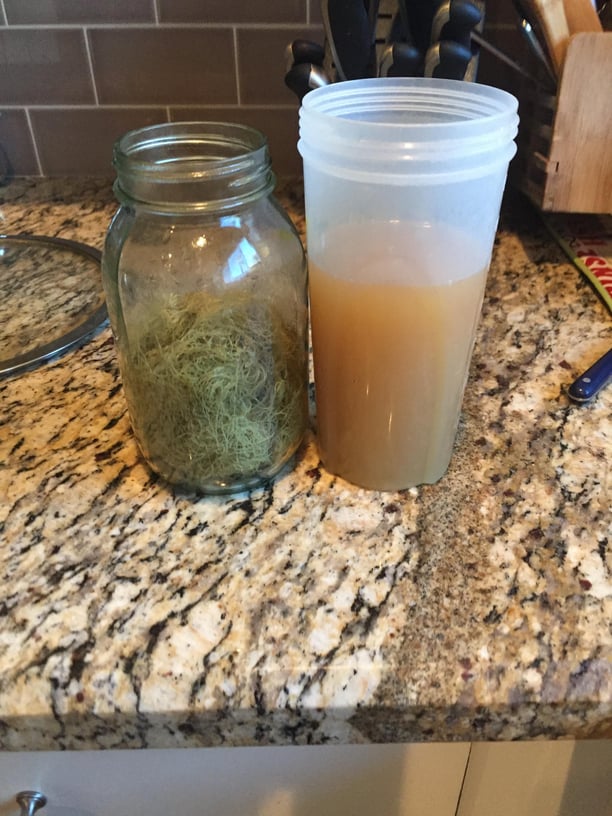Two Natural Cold and Flu Remedies You Should Know
There are many natural cold and flu remedies with claims about their ability to boost immune function or resolve your cold quickly. Many have very limited research to back up these claims however. One such herb has been used for this purpose for centuries and now it has more research to back up the claims. The herb is called Astragalus membranaceus. In preparation for the cold and flu season, I decided to make tincture (alcohol extract) of Astragalus and another of my favorite herbal cold and flu remedies, Usnea (picture below).
To make the tincture, I first placed Astragalus root in a mason jar ( I put as much as I could fit. The added vodka and let it sit for 30 days ( you could do it for as little as 10 days or as long as 6 weeks). I then strained out the Astragalus root and was left with a light brown liquid. I then pored this back into the mason jar and packed it with the Usnea. Usnea is a bit water proof so you have to turn the jar a few times to get it saturated (if it is not full like mine was). For better result you can finley chop the Usea. I just used it whole and let it sit for 10 days. Below is the finished product.

I will use 1-2 dropper fulls (about 1 ml) once daily and increase the dose if I feel sick. Its and acquired taste but works good. For more of the science behind these two natural cold and flu remedies see below.
Other natural cold and flu remedies
Astrgalus Membranaceus Natural Cold and Flu Remedy
Astragalus, as it is commonly called, is a plant that grows in northern climates and has been used in Traditional Chinese Medicine for thousands of years. This plant is typically used in formulas to treat inflammation and immunodeficiency syndromes. This makes it a good potential herb to use for supporting immune function in the general population as a natural cold and flu remedy or preventative agent. Indeed, it can and has been used in that capacity. Recent and past research on this herbs seems to support this use.
The interesting thing is that, the two most common uses tend to be opposing functions in the body. You see, inflammation is a condition of increased immune activity and immunodeficiency is one of decreased immune activity. This makes understanding how this plant works difficult. What research has recently confirmed, is that it does activate T cells (specific type of white blood cell) and this activity is responsible for the increased immune function.1 T cells are the cells the body uses to defend against virus and other microbes. In a double blind trial asthagalus increased T cell activity with more vigor than ecchinacia.2
Astragalus also helps to regulate immune cell activity and prevent it from being overly active. This function is responsible for it's antiinflammatory action. So if the immune activity is low it may enhance it and if it is too high it may reduce. When using this herb strictly for immune support, small amounts are used as a preventative and larger amounts when an infection is present.
Usnea Natural cold and Flu Remedy
Usnea also known as "old man's beard" grows in northern Arizona and similar climates through out the US. This plant, technically a lichen, has
.jpg?width=550&name=800px-Usnea_1_(2005_07_19).jpg)
strong antibacterial activities against microbes like staph and strep. In fact, it has superior antimicrobial against some bacteria compared to penicillin.3 It also has anti-fungal properties. The main mode of action is to inhibit the production of energy in microbial cells. Since it does not penetrate human cells well, they remain unaffected while the microbes die.
Natural Cold and Flu Remedy Strategies
Getting a cold or flu is somewhat inevitable in the fall and winter, but there are many things you can do to lessen your chance of getting sick and reduce the amount of time you are sick for.
The tincture described above is just one possible option. If you tend to get sick often you may benefit from a more deliberate personalized strategy session with a naturopathic doctor. This will help you uncover the cause of your "lowered immunity" or frequent illness. Sometimes this predisposition is coming from nutrient deficiencies, sometime digestive issues, genetics, and other times you may have a chronic infection. Click on the link below to set up a time or get in contact with us.
References
1. https://www.ncbi.nlm.nih.gov/pubmed/28830214
2. https://www.ncbi.nlm.nih.gov/pubmed/17661330
3. https://www.ncbi.nlm.nih.gov/pmc/articles/PMC3509606/

















